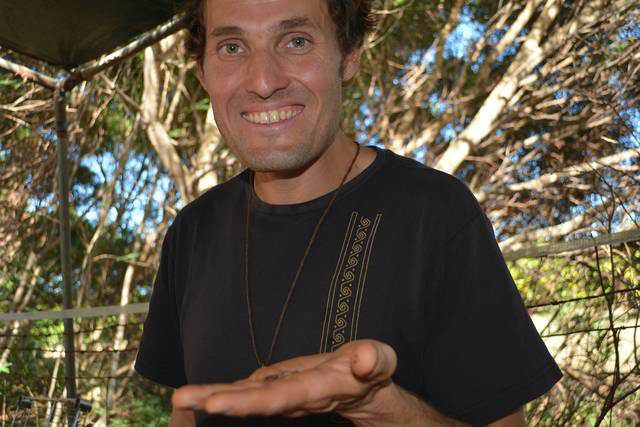MOLOAA — Jaro Spichal says he’s in the business of multiplying microbes. But, the Moloaa man grows more than bacteria and fungus at his farm nestled in the midst of noni tree groves on Kauai’s East Side. Spichal is the
MOLOAA — Jaro Spichal says he’s in the business of multiplying microbes.
But, the Moloaa man grows more than bacteria and fungus at his farm nestled in the midst of noni tree groves on Kauai’s East Side.
Spichal is the owner of Kauai Worms and he’s on a mission to help the island’s farmers and gardeners amp up their production with worm castings and compost.
He sells his products at the Kilauea Farmer’s Market and in select feed stores on Kauai, but Spichal isn’t just retailing soil amendments.
He wants to teach people how to use worms to compost their household waste, repurposing the remnants into a nutrient-rich addition for food production.
“The whole idea was about recycling when I started this worm farm,” Spichal said. “I had so much paper and I saw the trees needed mulch, and I was like, ‘how can we make this better’?”
So in 2014 he bought seven Indian Blue worms from Honolulu and tossed them into a plastic bin with table scraps, plus some of his stockpile of shredded paper and soaked cardboard.
Within months his population exploded.
“They double (in population) every three months if you just do the basics,” Spichal said. “And that’s just if you do the basics.”
The worms ate the fungus and bacteria that was breaking down Spichal’s household waste, creating nutrient-rich worm castings as they went. He mixed the castings at about 30 percent strength with the soil under the noni trees around his farm and watched them take off.
“The key for nature to do magic is through bacteria and fungus,” Spichal said. “Worms, that’s what they feed on and if you want to add some microbes, add some worms.”
With an ample amount of worms and castings, Spichal decided to start a business selling the excess — now he manages more than 100,000 worms and has added the red wriggler species to the mix.
In addition to worm castings and compost mixtures, Spichal sells the materials for people to start their own worm bins and said he’s passionate about teaching others how to start the cycle themselves.
“I used to give out handfuls of worms for free, but I found that people weren’t investing in them as much because they were free,” Spichal said. “So, I just sell the worms and the bins now and if they pay a little for it, they’re invested.”
And Spichal’s passion for sustainability doesn’t end at the farm. He says using worms to compost household waste could do wonders for the ticking clock on the island’s landfill.
“They’re saying that by something like 2020 the landfill will be filled up, and how much of that could be broken down by worms,” Spichal said.
During fiscal year 2015, Kauai residents and guests produced 81,500 pounds of total waste, according to Kauai County.
The Kekaha landfill is expected to be at capacity in 10 years. Food waste is among the top three contributors to the landfill, among plastic and paper, according to a 2007 waste characterization study.
“It’s easy to throw your scraps into the worm bin instead of the trash can,” Spichal said.
Spichal takes it a step further by using a blender to break down food waste into smoothies that the worms can break down more easily, turbo-charging production.
“I use a Ninja blender and it’s all contained, so you just put the scraps in and seal it and then blend it when you’re ready,” he said. “Then just pour it over the worms and put some shredded paper on top.”
Spichal says he basically just copied nature’s patterns when he created the worm farm, but his hopes are to integrate more elements; like eventually using the energy from the worm activity to heat a house.
“I’m always looking to make something sustainable so you don’t need to work too hard,” he said. “You start and create something that’s sustaining, and it just keeps going.”




